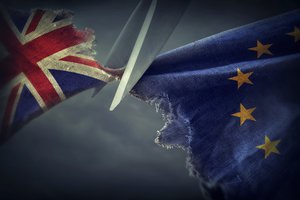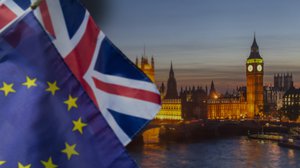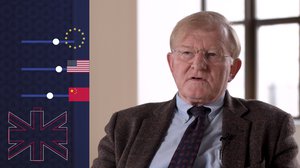[COLM O’CINNEIDE]
The Northern Ireland peace process and the peace settlement has started to play a major role in the debate about Brexit, and it’s an interesting and a rather complicated issue. Part of the peace process was a reassurance to the Catholic nationalist community in Northern Ireland that the status in Northern Ireland isn’t going to change, you’re still going to remain part of the UK, it’s not going to matter that much anymore because it’s going to be an open border with the Republic of Ireland, people can come and go, differences will be gradually dissolved over time. All of the steps that the agreement requires will not, on the face of it, be affected by Brexit because the agreement was written at a time when no one dreamt that the UK would withdraw from the EU, and certainly Ireland had no intention — still has no intention — of withdrawing from the EU, so it was never discussed in the agreement. So all the mechanisms of the agreement, the human rights guarantees contained in the agreement won’t actually be affected by Brexit.
[MICHEL BARNIER]
And this future relationship would need to avoid a hard border and protect north-south cooperation and the Good Friday Agreement. Once again, ladies and gentlemen, it is important to tell the truth: a UK decision to leave the single market and to leave the customs union would make border checks unavoidable.
[COLM O’CINNEIDE]
That’s likely to have a very severe economic impact. By way of example, Northern Ireland dairy production is very, very important to the Northern Irish economy. Cows’ milk and other associated dairy products, they don’t get processed in Northern Ireland, they get shipped across the border and get processed in the Republic of Ireland, which is actually where the dairy processing takes place for an economy of scale.
[THERESA MAY]
Mister Speaker, the friction-free movement of goods is the only way to avoid a hard border between Northern Ireland and Ireland, and between Northern Ireland and Great Britain, and it is the only way to protect the uniquely integrated supply chains and just-in-time processes on which millions of jobs and livelihoods depend.
[COLM O’CINNEIDE]
If a situation is created where a hard border exists between Northern Ireland and the Republic of Ireland, it may be much more difficult to ship milk across the border — health and safety requirements, trade requirements, agriculture policy requirements — that could severely impact the economy of both sides of the island. Now Brexit need not necessarily lead to that type of hard border being established. In fact, the Irish government has been pushing the UK government very strongly to guarantee that such a hard border won’t be established, and the UK government has provided lots of reassurances over the last year to that effect. So, both Dublin and London have talked about keeping the border as it is. But the current trade talks are revealing that that may very well be impossible to do.
[THERESA MAY]
The two models that are on offer from the EU are simply not acceptable. First, there is what is provided for in the European Council’s guidelines from March this year. This amounts to a standard free trade agreement for Great Britain, with Northern Ireland carved off in the EU’s customs union and parts of the single market, separated through a border in the Irish Sea from the UK’s own internal market. No prime minister of our United Kingdom could ever accept this; it would be a profound betrayal of our precious Union.
[COLM O’CINNEIDE]
There’s also a problem of the psychological impact of establishing a hard border. Now if you have a border in place, and quite a hard border, that has the potential to increase political tensions in Northern Ireland. Views differ as to the extent of the risks: some people say, the peace process is well established, a hard border isn’t going to change things; some people complaining about it are engaging in over-the-top rhetoric. Others say, yes, there is a potential threat here. We’ll have to wait and see.
[THERESA MAY]
What we are proposing is challenging for the EU. It requires them to think again, to look beyond the positions they’ve taken so far, and to agree a new and fair balance of rights and obligations. Because that is the only way to meet our commitments to avoid a hard border between Northern Ireland and Ireland without damaging the constitutional integrity of the UK and while respecting the result of the referendum.
[COLM O’CINNEIDE]
If that is true, if a hard border is established, then we are left to this risky situation involving a possibility of economic damage, a possibility of enhanced social tension and political tension.
[NARRATOR]
Brexit and human rights are just one of many topics covered within Complexity’s Embrace.
This book looks at the legal governance challenges presented by the United Kingdom’s decision to leave the European Union and illustrates the many connective elements across all five topic areas.


